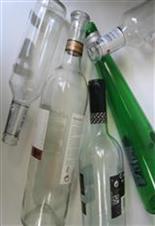
Glass Collection:
Most local councils will collect glass bottles, jars etc bi weekly. Glass bottles etc should be sorted in to separate bins provided for the different colours, this will help to avoid contamination at the recycling facility.
Bottle banks are also available at many local supermarkets and other drop off points.
Glass Recycling:
Glass recycling is the process of turning waste glass in to a useable product. Glass providing it is recycled properly can be recycled an infinite amount of times with no loss in quality.
Stage 1:
Glass is collected from bottle banks and is taken away to be cleaned.
Stage 2:
The lids and labels are removed using a mixture of water and mild chemicals to dissolve the glue.
Stage 3:
The glass is then taken to a sorting facility and the glass is sorted in to different colours so that green and blue bottles etc do not contaminate the colour of the clear bottles.
Stage 4:
Once separated the glass is taken to a processing plant and is crushed in to fine glass chips called ‘cullets’.
Stage 5:
The cullets are then sent to a furnace where it is mixed with sand, limestone and soda ash then heated to 1200°C
Stage 6:
The molten glass is then formed in to new bottles, jars and other glass products. The quality of the cullets designates what the glass can be used for e.g. Good quality cullets could be used for clear bottles, where as contaminated cullets would have to be used for coloured glass.
Stage7:
The new empty bottles are sent to companies who will fill them with products, and are then sold on to supermarkets. Who will sell them to consumers to enjoy and then recycle the glass again.
Fascinating Facts:
- In 1977 the first ever bottle bank in England was placed in Barnsley, Yorkshire. There are now over 25,000 bottle bank sites containing around 50,000 bottle banks all over the United Kingdom.
- Every bottle that is recycled saves enough energy to power a television for 20 minutes.
- For every tonne of glass that is recycled 1,330 pounds of sand, 433 pounds of soda ash and 433 pounds of limestone are saved.
- Recycling glass reduces air pollution by 14-20% and water pollution by 50%.
- The UK glass recycling rate is currently 50% while in Europe it is between 80-90%. This may be because in England, we average one bin to 2700 people, whereas in Europe the figure is one bin to every 1500 people.